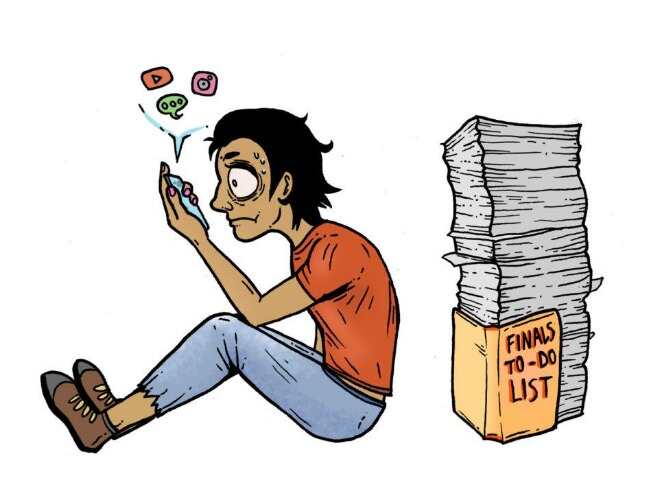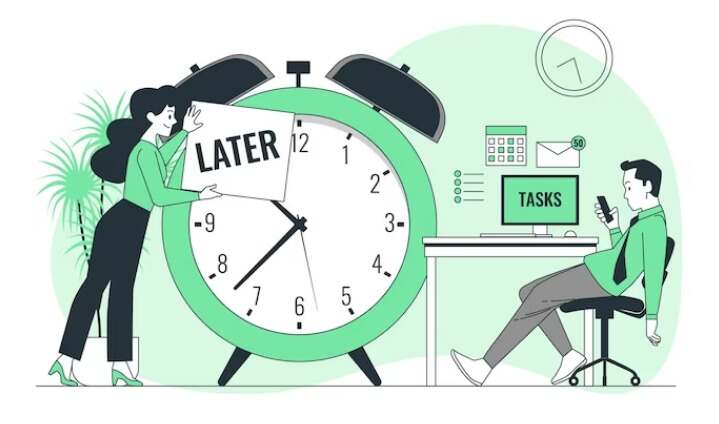Procrastination is a deep-rooted tendency which if not dealt with resistance and firmness will spread its roots obstinately trapping every victim of it into a vicious cycle of unfathomable consequences. Procrastination is a predominant phenomenon where a person becomes habitual in delaying their work, irrespective of knowing the negative outcome it can bear.
Every successful human has suffered from a phase of procrastination. Each one of us finds it more convenient to complete any given task just before the deadline rather than to do it in an ample amount of time. We keep convincing ourselves that we can work well under pressure, but how many times has that strategy truly led to our best work?
Cognitive and emotional factors
A person’s social environment, behavioural response and emotional intelligence play a significant role in pushing it into the hands of procrastination. Low confidence and self-doubt can be the biggest contributor to procrastination. Often the time given for task completion is underestimated by many which leads to continuous delays.
There are a lot of people who struggle to initiate their tasks due to low self-esteem and fear of failure. Sometimes while completing a task there are a lot of emotional challenges where limited emotional coping mechanisms can lead to procrastination as individuals may turn to avoidance rather than facing it.
Discomfort and fluctuating mood status such as feeling bored, stressed, or lacking motivation can impact the decision to procrastinate. Individuals often try to compare themselves to others evoking feelings of inadequacy which leads to emotional discomfort and then to procrastination to avoid those feelings.
Technology and procrastination
With the advent of technology, the human race has benefitted the most in all aspects. From doorstep delivery of your favourite food to online shopping in your comfort, everyone has enjoyed the privileges of technological advancement. But simultaneously it has contributed to the act of procrastination among the technology-driven generation.
Digital distractions work as tempting bait where people find more contentment engaging in non-essential online activities due to constant access to smartphones and various digital platforms. The ease of access to any information has made the procrastinators more indolent and inattentive. They assume that the content of their work can be easily available online so they keep postponing it.
Notification anxiety and the fear of missing out create a sense of urgency in individuals where they assume the response to incoming alerts should be immediate which leads to procrastination. Sometimes individuals intentionally procrastinate by engaging in unnecessary online entertainment or social interaction instead of focusing on their task completion.

Consequences of procrastination
The habit of procrastination acts significantly in deteriorating our performance and pushing us behind our competitors because of our reduced productivity and efficiency. Procrastinators have to deal with heaps of backlogs. The work done in a rush due to the approaching deadline often reflects the poor quality and improper execution of the outcome caused by insufficient time.
Procrastination snatches opportunities from the individual. It contributes to constant grief, stress, anxiety, and pressure which impact health and often strain relationships due to unmet commitments or unfulfilled responsibilities. Procrastination in professional and academic contexts can have a dreadful impact on one’s career advancements and grades. Constant self-doubt creates a negative environment and blocks the path to success
Procrastination is a chain reaction where one delay can lead to another creating a snowball effect. This reaction can stifle creativity as an individual due to less time finds it hard to explore or experiment. On the financial front, the habit of procrastination can lead to severe problems of delay in bill payment or loan etc causing trouble and unwanted anxiety.
Intervention and strategies
Procrastination is not a time-defined disease that can be cured in a specified schedule. It’s a long journey with strong willpower and determination which can be achieved by only those willing to evolve themselves into a better version. Awareness should be the first step towards mitigating procrastination. Educate yourself about it to develop effective coping mechanisms.
If a task appears lengthy try breaking it into small manageable steps. Instead of sitting long troublesome hours for work, design an organized routine followed by positive reinforcement or rewards to bring out quality outcomes. Procrastination requires acceptance of your shortcomings and immediate action on it.
Identifying and addressing fear of failure, lack of interest, and other distractions can aid the individual. Jealousy and pressure from the comparison can lead to self-doubts and procrastination. Instead, individuals should visualize themselves as a successful person irrespective of other’s achievements. Tackling emotions with gratitude and compassion will create a healthy environment where one can focus efficiently.

Conclusion
Overcoming procrastination is a multi-faceted journey. Every individual’s path will be different depending on their habits and procrastinating patterns. The journey in mitigating procrastination demands cultivating a positive relationship with time. But the first step lies in getting rid of self-doubt.
Gloomy days filled with tiredness will come and delaying work will appear more agreeable but stepping out of the comfort zone by facing challenges directly makes an individual more confident and determined. Procrastination is often seen as a harmless delay, a reprieve from the demands of our responsibilities. However, its insidious nature lies in the fact that it can slowly erode our productivity, hinder personal growth, and impede the realization of our goals.
Instead of finding a hideaway through procrastination, break the cycle by maintaining a positive mindset, being accountable and setting realistic goals. Every human has a set of reasons for procrastination. But what if we could shift our perspective and see procrastination not as a fleeting comfort but as a barrier to our potential? The time to act is now, not later.
-Tanya Shah
MUST READ: CONFRONTING THE EPIDEMIC: TAKING A STAND AGAINST SMOKING





